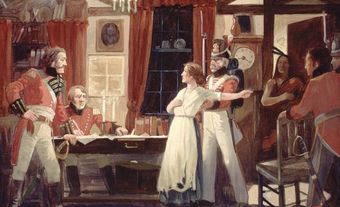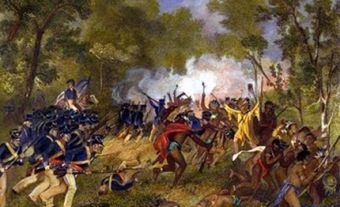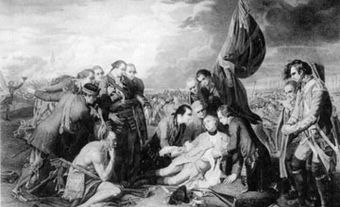
The Battle of Frenchtown, also known as the Battle of River Raisin or the River Raisin massacre, is the name given to a sequence of military actions during the War of 1812 that took place in Frenchtown, Michigan territory, in January 1813. It was the largest battle to be fought on Michigan soil. American forces sought to retake Fort Detroit, lost the previous summer, and while the initial skirmishing against British and First Nations forces had swung the tide in the Americans' favour, a series of counter attacks led to a decisive victory for the British and First Nations.
The First Battle of Frenchtown
The loss of Fort Detroit denied the Americans their key outpost for launching an invasion of Upper Canada. The retaking of Fort Detroit was critical to any significant operation and with the defeat of General Hull's forces, President James Madison appointed General William Henry Harrison (a future president himself) to command the army of the Northwest Territory. Harrison set out to turn Hull's defeat into a victory.
In January 1813, Harrison split his forces for a winter campaign against Detroit, with one column commanded by Brigadier General James Winchester, Harrison's second in command. Winchester's column was 2000 strong, but largely filled with untrained regulars and volunteers from Kentucky. En route, they established a base at the Maumee River Rapids.
Here, Winchester heard that the American settlement at Frenchtown was under attack by British and Aboriginal forces. Winchester disobeyed Harrison's orders to keep on point and answered the call for help, sending a detachment of 900 men under Colonel William Lewis. After a brief flurry of action in which the Americans charged across the frozen River Raisin, Lewis's men had driven off their enemies. Winchester soon arrived to find his forces victorious, but this first "Battle of Frenchtown" on 18 January 1813 would have larger consequences.
Harrison, arriving at Maumee, was happy with Lewis's success, but feared there were not enough American forces in Frenchtown to repulse a likely British counter attack. Instead of the more cautious and, in hindsight, better move of having Winchester's forces retreat from the position at Frenchtown, Harrison sent reinforcements at once. Captain Nathaniel Hart was dispatched to give Winchester the clear order "to hold the ground . . . at any rate."
The Second Battle of Frenchtown
But a strong defence required careful and disciplined preparations, and Winchester and his men failed on both accounts. Ignoring warnings that the British and First Nations would return quickly, Winchester argued it would take days before they could mount a serious counter attack. Captain Hart was shocked at the poor defensive preparations that Winchester had made. The men were dispersed across the post, and Winchester himself was staying in an abode some distance south of the town, and had taken with him the army's surplus of black powder. Thanks to Winchester's poor foresight, Frenchtown was ripe for the picking.
Colonel Henry Procter, British commander of the troops around Detroit, upon hearing of the defeat of British and First Nations forces at Frenchtown, began to plan for the town's recapture. Gathering a mix of 600 British regulars and local militia, and 800 First Nations forces under Chief Roundhead and Walk in the Water, Procter and his forces marched across the frozen Detroit River. On 21 January 1813, the forces gathered only 8 km from Frenchtown and planned their attack.
As the sun rose on 22 January, the British and First Nations unleashed a surprise attack with artillery fire, which, while unexpected, would have been more effective if ground troops had made a surprise assault first on the sleeping Americans. Instead, the noise of the artillery woke everyone. While American guards returned fire, they had not guarded the northern road into Frenchtown. Encircled, with Aboriginal troops cutting off any but a slim escape route, the American forces of 700 troops, regular and volunteer, were overwhelmed. A unit of Kentucky Rifles, however, held out longer than their commander. When they were shown the letter of surrender Winchester had signed, they prepared to continue to fight to the last man. It took American Major George Madison, who had also fought until the end, to convince them otherwise.
When captured, Winchester received warning from Procter that unless his men laid down their arms, he could not guarantee their safety as prisoners of the First Nations. Winchester ordered his men to surrender. The battle bled into a massacre.
After the battle was over, a group of drunken Aboriginal soldiers killed 30 or more American prisoners, many of whom had been wounded. Procter's weak command of his Aboriginal allies was in part to blame for their misconduct, something that would not have happened if a stronger war chief such as Tecumseh had been present. With these attacks, the American death toll rose to 400, with 500 taken prisoner. A handful of Americans escaped into the cold, taking their boots off to hide their tracks from the First Nations on their heels.
In the aftermath, General Harrison quickly retreated his forces, burned the stores at Maumee, and reconsidered his strategy. While conducting raids, he constructed a proper fortification, Fort Meigs, to launch his next offensive and prepared for another assault. The battle and massacre at Frenchtown was a bitter lesson for the untested American forces that the War of 1812 would not be short nor easily won.

 Share on Facebook
Share on Facebook Share on X
Share on X Share by Email
Share by Email Share on Google Classroom
Share on Google Classroom


